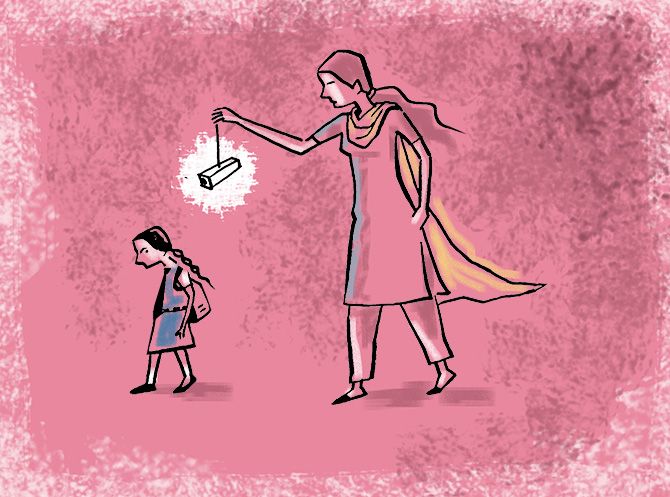'It is natural for parents to want to keep their children safe.'
'But there's a difference between putting up firewalls to protect them and snooping on them 24X7,' says Shuma Raha.
Illustration: Dominic Xavier/Rediff.com

How much surveillance should a child be subjected to?
Most parents would say that some degree of surveillance or oversight on their part is essential for the safety and wellbeing of their children.
You want to protect the person who cannot yet protect himself or herself.
You want to make sure that the child is not at risk from anyone, nor is engaging in risky behaviour.
Fair enough.
But where does protective watchfulness end and snooping begin?
How far can parental supervision go in the name of caring guardianship without violating a child's right to privacy?
The Delhi government's recent move to instal CCTV cameras in the classrooms of all state schools so that parents can watch them in real time via an app raises these questions forcefully.
The decision was immediately criticised as an assault on the children's right to privacy.
To which, Delhi Chief Minister Arvind Kejriwal has said that children come to school for an education and not for activities that need privacy.
This misses the point by a mile.
A school is not merely a place to get an education.
It is also a place where kids engage with the outside world, pick up social skills, make friends and have the occasional fight; it's a place where they learn to compete and coexist; in short, it's a place where they begin to develop as individuals in their own right.
Therefore, to have parents watch their every move in class, their every micro action and reaction, every minor fumble or triumph, could act like a dead weight on their spontaneity and stunt their creative and personal growth.
It's one thing to have cameras in other common areas of the school campus to capture, and perhaps deter, incidents of bullying or crime; it is quite another to keep children always pinioned to an oppressive parental gaze.
Needless to say, the CCTVs will watch the teachers too, ostensibly to keep them on their toes and make sure that they do not abuse any child or resort to corporal punishment.
These may be real problems, for unlike in the expensive private schools, the quality of teachers in government schools often leaves a lot to be desired.
However, the solution to this is not Orwellian hyper surveillance.
The Delhi government, which has been remarkably successful in improving learning outcomes in state schools, must know that the quality and conduct of teachers can be toned up through traditional methods of oversight and incentivisation.
Hence, the CCTV gambit seems to be more for the satisfaction of parents than for anything else.
There's no question that CCTVs are a powerful security measure, because their footage can be used for the post-facto analysis of incidents.
The city of London, which has an estimated 500,000 cameras on its streets, has additionally built artificial intelligence and analytics into its civic surveillance system so that it red flags any abnormal behaviour and escalates it to a human who can then track that anomaly in real time.
The point is that there are choices to be made in the way we use technology.
In May this year, San Francisco banned facial recognition technology for its potential to be misused; China is using the technology extensively to surveil its citizens.
I know parents who approve of the decision to give Delhi's citizens access to the live feed of their children in the classroom.
And their kids don't even go to state schools.
This is because they think it's in sync with the steps they take to safeguard their children.
Most of them have installed CCTVs in their homes so they can check on their kids while they are away and ensure that the domestic help is not abusing them.
And worldwide, many parents patrol the online footprint of their children, spy on their social media activity and track the Web sites they visit.
This is not only because the Internet can be a perilous space for the young and parents are anxious about their safety, but also because they want to find out what is going on in their lives and minds.
It is natural for parents to want to keep their children safe.
But there's a difference between putting up firewalls to protect them and snooping on them 24X7.
It's a pity the Delhi government hasn't got that.











